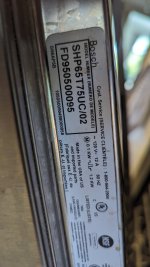That's not what I wanted to hear. Current frigidaire is dying. Every frigidaire dishwasher made for more than the last decade passes all power through the door switch which is undersized. The switch and wiring burns up. They don't change the design as it generates recurring revenue. I have cleaned up the contacts a few times but the thermal damage is significant and I refuse to give them money for a garbage part.I actually checked if I didn't get 2 last time.
The first question I was asked " do we need a new dishwasher?". Not sure if there was a good morning in there.
This dishwasher has been nothing but crap in my opinion.
Hated it from day 2. And that's not even from the fact that it has had the same part fail 3 times.
For a long time it wouldn't dissolve the detergent tabs, or the dishes smelled like the washing chemicals.
It also doesn't have a heating element to dry the dishes..
It dries the dishes by rinsing them with boiling water so they heat up and dry themselves from the temperature.
When the time comes, it's replacemebt will not be a Bosch.
I was going to go with Bosch as that seemed to be near the top of the pile. It is annoying that you have to go up to 800 series to get a dryer better than cross your fingers and hope. As per @Scuba Steve I was looking at 300 series. 500 series has a slight drying advantage as it pops the door open to let the steam out. I'm considering 500 but won't pay for an 800 (unless I can find one for a crazy price).
















